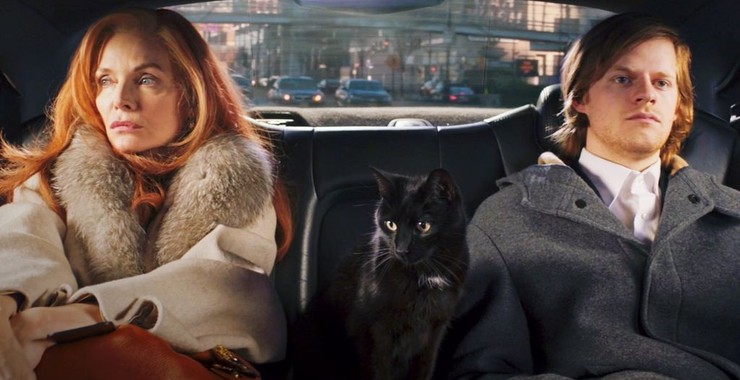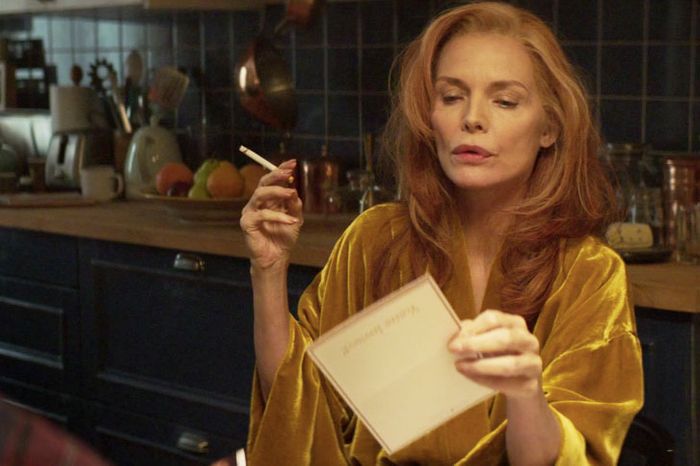Manhattan socialite Frances Price has burned through the inheritance left by dead husband Frank and is on the verge of destitution. You wouldn’t know it from her demeanor; Frances (Michelle Pfeiffer) is insouciant. She and grown son Malcolm (Lucas Hedges), as co-dependent a pair as they come, continue to live as they always have, cavalier about their cash as they throw it around without thought. The Prices’ accountant, however, is signaling a 5-alarm fire. Chastened, Frances and Malcolm sell off what they can before the bank swipes it all, and slink off to Paris where they’ll live cheaply in a borrowed apartment.

Or not.
Frances continues to spend money like it’s going out of style, like she’s allergic to it, like it’s completely meaningless to her. Outside of their comfort zone in Paris, they assemble an eclectic cast of characters including a cat they call Frank, believing it to be the spirit of their dead husband/father; a lonely fan who refers to herself as Madame Reynard (Valerie Mahaffey), who insinuates herself quite boldly, and whom Frances surprisingly tolerates; Madeleine the Medium (Danielle Macdonald) who speaks to the dead; Malcolm’s ex-fiancée Susan (Imogen Poots), who arrives boasting a new fiancé; and many more besides.
Watching French Exit, a film I’d anticipated quite fervently, I had two thoughts: 1. director Azazel Jacobs is trying very hard to make a Wes Anderson movie, and 2. he’s no Wes Anderson. But he borrows quite heavily from him, with his shoebox setting, a dysfunctional family, dark comedy, deadpan line delivery, and of course Anderson’s signature contradictory characters, who often say and do terrible things, yet we still root for them because their flaws make them fragile, and human.
Though I love the source material (Patrick DeWitt’s novel), the film didn’t quite connect. Trying and failing to be Wes Andersons sets us up for inevitable disappointment. DeWitt’s novel is quirky, it belongs in a slightly surreal, slightly stylistic universe, but the film adaptation needed to find its own brand of quirk instead of plagiarizing from someone else. The only saving grace here is Michelle Pfeiffer, who’s actually quite astonishing. Not only is she perfection as Frances Price, a woman whose feet never seem to quite touch the ground, she carries the film on her slim shoulders. Frances isn’t easy to know. She keeps everyone but son Malcolm at arm’s length. She’s caustic and arch and sometimes ironic, but never earnest, rarely sincere. Disdain drips from her like ash from her cigarette. She’s withholding, but she has the capacity to surprise us. Pfeiffer delivers such a nuanced performance that even though we never quite shake all the secrets and motivations out of Frances, we still get on board, we come to see her as quite empathetic, hard to do for a rich white woman of so much privilege it’s practically her perfume. Everything else is just a bit of a disappointment, but like a mother heroically hoisting a car single-handedly to save her child, so Pfeiffer does for this film, even if it isn’t worthy of her.




What an excellent review Jay you make me want to see it and not see it all at the same time.
LikeLiked by 1 person
“Chastened, Frances and Malcolm sell off what they can before the bank swipes it all, and slink off to Paris where they’ll live cheaply in a borrowed apartment.”
Live cheaply? In Paris? Uh…
LikeLiked by 1 person
As much as I’d like to see this, I’m only really here for the outstandingly written reviews!
LikeLiked by 1 person
I don’t think even Michelle could save me from watching this and throwing things at … um, other things.
LikeLike
“French Exit”….. I…. I…. But no, I’m s gentleman.
French Exit… *makes note*
LikeLike
Pingback: the thingy (2013) aka the miracle of life aka the thingy: confessions of a teenage placenta – film miasma
Bad burning.💰🐋💦
LikeLike
An interesting review! I didn’t expect her character to be empathetic. Would like to watch this!
LikeLike